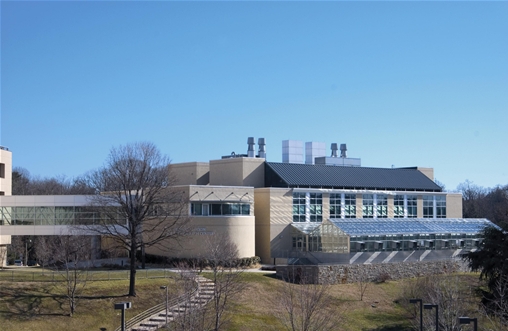School of Computer, Mathematical & Natural Sciences
Dixon Research Center

On October 17, 2003, Morgan State University formally opened the Richard N. Dixon Science Research Center, named for former state treasurer, the Honorable Richard N. Dixon. This $23.3 million, three-story (48,500 gross square feet) scientific research building includes 26 research laboratories, state-of-the-art teaching/research greenhouse and the 100-seat Travelers Auditorium. The concrete and glass structure is joined by an overhead bridge to the Science Complex, which is used for classrooms, research and teaching laboratories.
The goals of the Center are: (1) to assist in addressing the health concerns of the urban environment and the nation; (2) to help support graduate and undergraduate research programs in the departments of biology, chemistry and physics; and (3) to assist the school in attracting new faculty to expand the departments' funded research potential.
Current Research Foci:
Biology - Stress and cardiovascular disease, HIV/AIDS, neuroscience, neurodevelopment/neurodisorders, molecular and developmental genetics, environmental toxicology and biosensors, environmental microbiology, environmental science, plant molecular biology, molecular biology/gene expression and bioinformatics.
Chemistry - Biomedical applications of nanoparticles and microwaves, analytical sensors for monitoring pollutants and biological activity, synthesis of fluorescent dyes and conductive polyprole polymers for biosensors, development of near infrared dyes for use in biological sensors, development of fluorescent techniques for trace impurities, development of inorganic compounds for use in cancer treatment.
Physics - Nanotechnology and its applications, digital image processing, scanning, atomic force, scanning tunneling microscopy, Mössbauer spectroscopy, magnetic thin films and bioinformatics.
The four Core Laboratories in the Dixon Research Center each consist of state-of-the-art equipment, a core facility director and a core facility technician. These laboratories are as follows:
- The Molecular and Cellular Biology Core Laboratory
- The Histochemistry/Cytology Core Laboratory
- The Proteomics/Chemical Biology Core Laboratory
- Bioinformatics Core Laboratory
Contact Information
School of Computer, Mathematical, and Natural Sciences
Dr. Paul Tchounwou, Dean
Dixon Science Research Center Rm 200
1700 E. Cold Spring Lane
Baltimore, MD 21251
P: 443-885-4515
E: scmns-deans-office@morgan.edu
Contact Information
School of Computer, Mathematical, and Natural Sciences
Dr. Paul Tchounwou, Dean
Dixon Science Research Center Rm 200
1700 E. Cold Spring Lane
Baltimore, MD 21251
P: 443-885-4515
E: scmns-deans-office@morgan.edu

